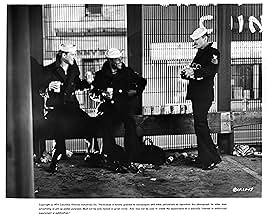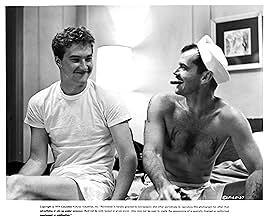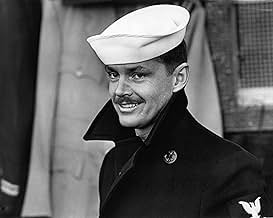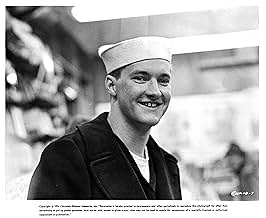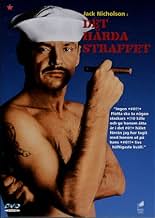NOTE IMDb
7,5/10
30 k
MA NOTE
Deux hommes de la Marine reçoivent l'ordre d'emmener un jeune délinquant en prison, mais ils décident de lui faire passer un dernier bon moment en cours de route.Deux hommes de la Marine reçoivent l'ordre d'emmener un jeune délinquant en prison, mais ils décident de lui faire passer un dernier bon moment en cours de route.Deux hommes de la Marine reçoivent l'ordre d'emmener un jeune délinquant en prison, mais ils décident de lui faire passer un dernier bon moment en cours de route.
- Réalisation
- Scénario
- Casting principal
- Nommé pour 3 Oscars
- 6 victoires et 9 nominations au total
Patricia Hamilton
- Madame
- (as Pat Hamilton)
Avis à la une
My absolutely favorite Jack Nicholson film has always and forever will be The Last Detail. I don't think he was ever better on the screen as William Baddusky of the United States Navy. I enjoyed his performance and the film itself on so many levels. Probably not surprising since the script was done by Robert Towne who would soon be teaming with Nicholson again for the critical and popular success Chinatown.
It's a simple story, not really any plot to the film. Two sailors, Jack Nicholson and Otis Young, both of them lifers in the Navy are stationed in Norfolk and get themselves an assignment to escort a prisoner to the Naval Stockade at Portsmouth. Of course with the per diem allowance for the two men and the prisoner and five days to travel in, Nicholson and Young are thinking of a mini-spree at government expense.
It comes to that and a lot more. the prisoner is newcomer Randy Quaid whose big crime is that he attempted to steal $40.00 from a charity collection box. For that he's getting eight years in military prison and a dishonorable discharge. A dishonorable discharge even today is not a good thing for one's resume.
As Nicholson and Young both remark, someone really stuck it to him. Let's face it what Quaid did in civilian life would probably be considered petty larceny and his jail time might be measured in days. Turned out it was the base commander's wife's favorite charity so it got stuck to him good. Sad because the indications we get is that Quaid was a troubled kid in civilian life and probably military service offered him a chance to straighten up and fly right.
It's done that for many others including Nicholson and Young who make it very clear even on this disagreeable detail they do like the Navy and like serving in it.
They've got five days to deliver Quaid to Portsmouth so the journey becomes quite the odyssey for the three of them up the Atlantic coast. The three men have a great chemistry between them, you get involved with their lives and really feel for young Quaid and his plight. Quaid gets shown a good time and maybe that's not such a good thing considering what he is facing.
The Last Detail is a nice realistic look at the military both its flaws and good points. A lot of similarity here in the issues raised to From Here to Eternity and if I mention The Last Detail in the same sentence favorably as From Here to Eternity, you know how good it must be.
It's a simple story, not really any plot to the film. Two sailors, Jack Nicholson and Otis Young, both of them lifers in the Navy are stationed in Norfolk and get themselves an assignment to escort a prisoner to the Naval Stockade at Portsmouth. Of course with the per diem allowance for the two men and the prisoner and five days to travel in, Nicholson and Young are thinking of a mini-spree at government expense.
It comes to that and a lot more. the prisoner is newcomer Randy Quaid whose big crime is that he attempted to steal $40.00 from a charity collection box. For that he's getting eight years in military prison and a dishonorable discharge. A dishonorable discharge even today is not a good thing for one's resume.
As Nicholson and Young both remark, someone really stuck it to him. Let's face it what Quaid did in civilian life would probably be considered petty larceny and his jail time might be measured in days. Turned out it was the base commander's wife's favorite charity so it got stuck to him good. Sad because the indications we get is that Quaid was a troubled kid in civilian life and probably military service offered him a chance to straighten up and fly right.
It's done that for many others including Nicholson and Young who make it very clear even on this disagreeable detail they do like the Navy and like serving in it.
They've got five days to deliver Quaid to Portsmouth so the journey becomes quite the odyssey for the three of them up the Atlantic coast. The three men have a great chemistry between them, you get involved with their lives and really feel for young Quaid and his plight. Quaid gets shown a good time and maybe that's not such a good thing considering what he is facing.
The Last Detail is a nice realistic look at the military both its flaws and good points. A lot of similarity here in the issues raised to From Here to Eternity and if I mention The Last Detail in the same sentence favorably as From Here to Eternity, you know how good it must be.
Often regarded as a comedy-drama, 'The Last Detail' always stood out to me as a pure drama. It tells the story involving a group of Navy officers: a young and meek officer (Randy Quaid) steals some money but gets caught; the two others (Jack Nicholson and Otis Young) are to take him to prison. They (especially Nicholson) get somewhat attached to the boy when they see how young (ie.: don't know much of the world) and weak he is and decide to show him how to be a man before putting him away.
A look at the cast/crew shows how promising the film is. Hal Ashby is a fine director, whose films I always like/love (except maybe for 'Coming Home', which often gets too preachy and melodramatic); the screenplay is done by Robert Towne, the same guy who would later do 'Chinatown'; and the leading actor is Jack Nicholson, one of cinema's greatest actors.
Speaking of Jack Nicholson, he is just brilliant here. His character, 'Bad-Ass' Buddusky, is the type of character he is at best with: sarcastic and irreverent even when serious, yet very smart and caring in his own way. He acts as a father figure for the young Meadows (Quaid), trying to lift his mood and have him something to remember and be happy before having to face the harsh conditions of prison. Quaid and Young, alongside the supporting characters, end up overshadowed by Nicholson's performance, but they too make a great work with their characters.
As typical of a 70's and/or Hal Ashby film, 'The Last Detail' has great photography and is strangely comfortable to look at. The movie is very realistic too, with both situations and characters being very believable and sympathetic. The characters are very fleshed out and developed, making it difficult not to like or remain indifferent towards them. I've also heard that the way Navy/Marine officers are portrayed are also very close to the real thing, without forcing their portrayal as a way of criticism of the armed forces, which many directors would jump at the chance to do (specially considering the time this movie was made). In truth, I didn't feel that the film was a critique of the military like many say.
My only complaint on the movie is that it's supposed to be a comedy too. Yes, there are awkward situations and Jack Nicholson's typical rebellious way of dealing with everything; but the movie tends to make them more interesting than actually funny. Not that I'm saying this is bad; 'The Last Detail' is a remarkable movie in every aspect and one of the best pure dramas I've seen.
A look at the cast/crew shows how promising the film is. Hal Ashby is a fine director, whose films I always like/love (except maybe for 'Coming Home', which often gets too preachy and melodramatic); the screenplay is done by Robert Towne, the same guy who would later do 'Chinatown'; and the leading actor is Jack Nicholson, one of cinema's greatest actors.
Speaking of Jack Nicholson, he is just brilliant here. His character, 'Bad-Ass' Buddusky, is the type of character he is at best with: sarcastic and irreverent even when serious, yet very smart and caring in his own way. He acts as a father figure for the young Meadows (Quaid), trying to lift his mood and have him something to remember and be happy before having to face the harsh conditions of prison. Quaid and Young, alongside the supporting characters, end up overshadowed by Nicholson's performance, but they too make a great work with their characters.
As typical of a 70's and/or Hal Ashby film, 'The Last Detail' has great photography and is strangely comfortable to look at. The movie is very realistic too, with both situations and characters being very believable and sympathetic. The characters are very fleshed out and developed, making it difficult not to like or remain indifferent towards them. I've also heard that the way Navy/Marine officers are portrayed are also very close to the real thing, without forcing their portrayal as a way of criticism of the armed forces, which many directors would jump at the chance to do (specially considering the time this movie was made). In truth, I didn't feel that the film was a critique of the military like many say.
My only complaint on the movie is that it's supposed to be a comedy too. Yes, there are awkward situations and Jack Nicholson's typical rebellious way of dealing with everything; but the movie tends to make them more interesting than actually funny. Not that I'm saying this is bad; 'The Last Detail' is a remarkable movie in every aspect and one of the best pure dramas I've seen.
Jack Nicholson is a performer with the rare ability to completely immerse himself in a chosen role and convince the audience of the stark reality of his performance. Playing Navy Signalman First Class Billy "Badass" Buddusky in Hal Ashby's 1973 film rendition of Darryl Ponicsan's novel, "The Last Detail" is a sterling example of that uncommon talent. Rough-edged but understanding, crude but compassionate, Buddusky and fellow "lifer" Gunner's Mate First Class "Mule" Mulhall (skillfully portrayed by Otis Young) are "detailed" as armed Shore Patrol guards to escort a young sailor, Larry Meadows (Randy Quaid) from Norfolk, Va. to a naval prison in Portsmouth, NH in order to serve an eight-year sentence after being convicted at a court-martial of petty theft.
The five-day journey northward is an adventure for all three. Sympathizing with Meadows's plight, apprised of his utter naivete and realizing his sentence far exceeds the severity of the offense, Buddusky and Mulhall conduct their version of a cram course in traditional male rights of passage--ranging from a drunken spree in Washington, D.C. to duking it out with Marines in New York City and getting their charge sexually initiated with a Boston prostitute--if for no other reason than to give him some taste of what he will not be experiencing for a long time and to teach him in some small way to assert himself as an individual.
Darryl Ponicsan's novel (which hit the racks at practically the same time the film had been released--the book's ending is quite different and, to me, is much less believable than the film's) was initially hailed as a polemic against what many believed was the cold indifference of the military establishment. However, since that time, it has been judged more a compelling "slice of life" drama about the complexities of everyday human behavior and how it is shaped by our own decisions and by entities beyond our immediate purview. And, more importantly, it forces us to think about how our ever-more-complicated society is increasingly unable to find ways to help its young people constructively mark transition into adulthood.
"The Last Detail" is a sadly overlooked but superb blend of pathos, ribald bittersweet humor, hard-edged '70s realism and insightful and subtle human drama, one that brashly and subtly brought back many personal memories of my Navy hitch and a work that says something to all of us by merely focusing upon a small "detail" of a sadly overlooked and unappreciated decade that was alternately (and simultaneously) bleak yet hopeful.
The five-day journey northward is an adventure for all three. Sympathizing with Meadows's plight, apprised of his utter naivete and realizing his sentence far exceeds the severity of the offense, Buddusky and Mulhall conduct their version of a cram course in traditional male rights of passage--ranging from a drunken spree in Washington, D.C. to duking it out with Marines in New York City and getting their charge sexually initiated with a Boston prostitute--if for no other reason than to give him some taste of what he will not be experiencing for a long time and to teach him in some small way to assert himself as an individual.
Darryl Ponicsan's novel (which hit the racks at practically the same time the film had been released--the book's ending is quite different and, to me, is much less believable than the film's) was initially hailed as a polemic against what many believed was the cold indifference of the military establishment. However, since that time, it has been judged more a compelling "slice of life" drama about the complexities of everyday human behavior and how it is shaped by our own decisions and by entities beyond our immediate purview. And, more importantly, it forces us to think about how our ever-more-complicated society is increasingly unable to find ways to help its young people constructively mark transition into adulthood.
"The Last Detail" is a sadly overlooked but superb blend of pathos, ribald bittersweet humor, hard-edged '70s realism and insightful and subtle human drama, one that brashly and subtly brought back many personal memories of my Navy hitch and a work that says something to all of us by merely focusing upon a small "detail" of a sadly overlooked and unappreciated decade that was alternately (and simultaneously) bleak yet hopeful.
If you respond to this film, you will probably go all the way and love it as much as I do. It is probably the high point of the drama of social realism started back by the like of "Marty."
It is Nicholson's film, yet Quaid and Otis Young(in his only good movie) really shine as well. It is the most heartbreaking of material played without sap or sentiment. Obscenity like this was still pretty new to movies back in 73, be sure to avoid edited T.V. versions. Reading the comments, it is sad that todays movie fans, spoonfed sledgehammer crappola, really can't respond to a drama played with the kind of subtle grace of "The Last Detail." Give it a shot. Ten out of ten.
It is Nicholson's film, yet Quaid and Otis Young(in his only good movie) really shine as well. It is the most heartbreaking of material played without sap or sentiment. Obscenity like this was still pretty new to movies back in 73, be sure to avoid edited T.V. versions. Reading the comments, it is sad that todays movie fans, spoonfed sledgehammer crappola, really can't respond to a drama played with the kind of subtle grace of "The Last Detail." Give it a shot. Ten out of ten.
I read somebody's comment that this film isn't "deep." I think that viewer missed a whole layer of the story. you have to keep in mind that this was written and produced during the vietnam war and released during the early months of Watergate.
The story is about these two working class sailors, who are completely disenfranchised, just "doing their job." They're good guys but in the end, don't lift a finger to stop a massive injustice. They don't even take the time to think about it, because they feel there's nothing they can do about it. They pay lip services to how wrong things are about the situation, but in the end they do what "the man" says and they're just as much to blame for the problem as the commanding officers above them.
Through the course of the film, the sailors meet a lot of "chatting class" folks who are mad at Nixon and discussing politics, and they meet Hari Krishnas who are chanting to change things, but nobody is really taking any ACTION. Everyone is pissed off at the injustice of the world but nobody does anything about it. It's about inaction. And that inaction slowly boils up in the main characters and turns into anger that brings the film to a sad end. (It's one of those great stories that gets you pissed off at the injustice in the world...)
Having said all that, on a more tangible level, the performances and scripting are full of emotion and Nicholson's and Quaid's performance are amazing and hilarious to watch. But this isn't really a comedy in the end...more tragic really (with some good laughs along the way).
Check it out!
The story is about these two working class sailors, who are completely disenfranchised, just "doing their job." They're good guys but in the end, don't lift a finger to stop a massive injustice. They don't even take the time to think about it, because they feel there's nothing they can do about it. They pay lip services to how wrong things are about the situation, but in the end they do what "the man" says and they're just as much to blame for the problem as the commanding officers above them.
Through the course of the film, the sailors meet a lot of "chatting class" folks who are mad at Nixon and discussing politics, and they meet Hari Krishnas who are chanting to change things, but nobody is really taking any ACTION. Everyone is pissed off at the injustice of the world but nobody does anything about it. It's about inaction. And that inaction slowly boils up in the main characters and turns into anger that brings the film to a sad end. (It's one of those great stories that gets you pissed off at the injustice in the world...)
Having said all that, on a more tangible level, the performances and scripting are full of emotion and Nicholson's and Quaid's performance are amazing and hilarious to watch. But this isn't really a comedy in the end...more tragic really (with some good laughs along the way).
Check it out!
Le saviez-vous
- AnecdotesThe script was completed in 1970 but contained too much profanity to be shot as written. Columbia Pictures waited for two years trying to get writer Robert Towne to tone down the language. Instead, by 1972, the standards for foul language relaxed so much that all the profanity was left in.
- GaffesThe MAA Master Chief is not wearing a Master-at-Arms rating badge; he is wearing a Boatswain mate rating badge.
The Master At Arms rating was disestablished in 1921, but was officially re-established on 1 August 1973. Therefore, as the story takes place, a Master Chief Boatswain's Mate being assigned the collateral duty of MAA is entirely accurate.
- Bandes originalesNever Let The Left Hand Know
by Jack Goga
Meilleurs choix
Connectez-vous pour évaluer et suivre la liste de favoris afin de recevoir des recommandations personnalisées
- How long is The Last Detail?Alimenté par Alexa
Détails
- Date de sortie
- Pays d’origine
- Site officiel
- Langue
- Aussi connu sous le nom de
- El último deber
- Lieux de tournage
- Sociétés de production
- Voir plus de crédits d'entreprise sur IMDbPro
Box-office
- Budget
- 2 300 000 $US (estimé)
Contribuer à cette page
Suggérer une modification ou ajouter du contenu manquant

Lacune principale
By what name was La dernière corvée (1973) officially released in India in English?
Répondre


